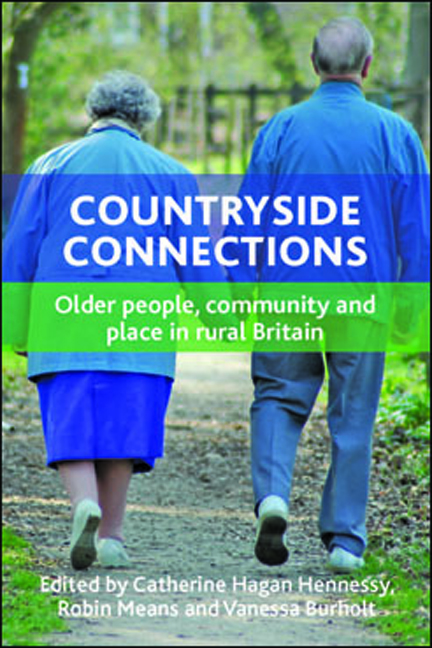Book contents
- Frontmatter
- Contents
- List of tables and figures
- Acknowledgements
- Notes on contributors
- Foreword
- one Countryside connections in later life: setting the scene
- two Conceptualising rural connectivities in later life
- three Rural connectivity and older people’s leisure participation
- four Connecting with community: the nature of belonging among rural elders
- five Beyond transport: understanding the role of mobilities in connecting rural elders in civic society
- six Deep mapping and rural connectivities
- seven Older people, low income and place: making connections in rural Britain
- eight Connecting with older people as project stakeholders: lessons for public participation and engagement in rural research
- nine Towards connectivity in a Grey and Pleasant Land?
- Index
five - Beyond transport: understanding the role of mobilities in connecting rural elders in civic society
Published online by Cambridge University Press: 04 March 2022
- Frontmatter
- Contents
- List of tables and figures
- Acknowledgements
- Notes on contributors
- Foreword
- one Countryside connections in later life: setting the scene
- two Conceptualising rural connectivities in later life
- three Rural connectivity and older people’s leisure participation
- four Connecting with community: the nature of belonging among rural elders
- five Beyond transport: understanding the role of mobilities in connecting rural elders in civic society
- six Deep mapping and rural connectivities
- seven Older people, low income and place: making connections in rural Britain
- eight Connecting with older people as project stakeholders: lessons for public participation and engagement in rural research
- nine Towards connectivity in a Grey and Pleasant Land?
- Index
Summary
Introduction
This chapter argues for an understanding of connectivity through mobility by elders living in rural areas that goes beyond the traditional transport planning focus on the supply of and demand for transport services. This involves consideration of not just physical movement, but also all the other ways in which older people can be ‘mobile’ for connectivity and the wider benefits and meanings mobility brings, for example, video-calling grandchildren using computer software, finding out about shopping delivery services for use in bad weather or compiling a scrapbook about a past alpine holiday. Following a brief review of methods, a conceptual framework for mobility that can be applied across the life course is presented. The following section applies this framework as a context to understanding some of the key mobility policy and practice challenges for the promotion of the connectivity of rural elders, which relate to the availability of mobility options – cars in particular – and the associated issues of accessibility and mobility-linked social exclusion. It is concluded that the more holistic appraisal of mobility for older citizens brings important conceptual benefits. A picture emerges of rural areas being ‘car-intensive’, but less car-dependent than identified in previous studies, with accessibility for connectivity also relatively unproblematic for the majority, although with minorities representing important exceptions. Practical relevance is drawn out for planning and urban design, as well as for health and social care professionals.
Methods
The analysis draws on the quantitative survey described in Chapter One and two qualitative data-collection activities conducted specifically for the mobility and transport study that was part of the Grey and Pleasant Land (GaPL) project: 45 semi-structured interviews, for which the participants were selected to represent a range of mobility lifestyles; and 10 phenomenological interviews, with participants selected according to varying health and mobility statuses.
The GaPL survey contained a series of mobility-related questions that addressed travel patterns and behaviours, mode choice (including over time), and whether mobility played a role in either exclusion from, or engagement with, the local community. Participants in the semi-structured interviews were mostly recruited from volunteers identified through the quantitative survey, but due to the low representation in the quantitative survey sample of a particular group of interest (people who had recently given up car-driving), seven further participants were recruited from outside of the quantitative survey sample.
- Type
- Chapter
- Information
- Countryside ConnectionsOlder People, Community and Place in Rural Britain, pp. 125 - 158Publisher: Bristol University PressPrint publication year: 2014
- 1
- Cited by



